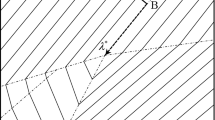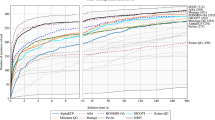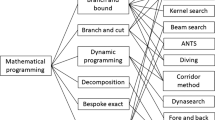Abstract
The paper presents reformulation techniques to reduce the complexity of a knapsack linear integer problem. Reformulation significantly reduces the number of standard branch and bound sub-problems required to verify optimality. Computational results of the various technique are given to compare the number of branch and bound iterations on some selected knapsack linear integer problems before and after the reformulation.
Similar content being viewed by others
References
Abdel-Basset M, El-Shahat D, Faris H, Mirjalili S (2019) A binary multi-verse optimizer for 0–1 multidimensional knapsack problems with application in interactive multimedia systems. Comput Ind Eng 132:187–206
Al-Rabeeah M, Munapo E, Al-Hasani A, Kumar S, Ebehard A (2019) Computational enhancement in the application of the branch and bound method for linear integer programs and related models. IJMEM 4(5):1140–1153
Barnhart C, Johnson EL, Nemhauser GL, Savelsbergh MWP, Vance PH (1998) Branch and price column generation for solving huge integer programs. Oper Res 46:316–329
Barnhart C, Hane CA, Vance P (2000) Using branch-and-price-and-cut to solve origin-destination integer multicommodity flow problems. Oper Res 48:318–326
Bealie EML (1979) Branch and bound methods for mathematical programming xj = 100 xj0+101 xj1+102 xj2+…+10k xjK systems. Ann Discrete Math 5:201–219
Beasley JE (ed) (1996) Advances in linear and integer programming. Oxford University Press, Oxford
Brunetta L, Conforti M, Rinaldi G (1997) A branch and cut algorithm for the equicut problem. Math Program 78:243–263
Dahmani I, Hifi M, Saadi T, Yousef L (2020) A swarm optimization-based search algorithm for the quadratic knapsack problem with conflict graphs. Expert Syst Appl 14815:113224
Dakin RJ (1965) A tree search algorithm for mixed integer programming problems. Comput J 8:250–255
Fampa M, Lubke D, Wang F, Wolkowicz H (2020) Parametric convex quadratic relaxation of the quadratic knapsack problem. Eur J Oper Res 281(16):36–49
Fomeni FD, Kaparis K, Letchford AN (2020) A cut-and-branch algorithm for the Quadratic Knapsack Problem. Discrete Optim 100579, ISSN 1572–5286. https://doi.org/10.1016/j.disopt.2020.100579
Fukasawa R, Longo H, Lysgaard J, Poggi de Aragao M, Uchoa E, Werneck RF (2006) Robust branch-and-cut-price for the capacitated vehicle routing problem. Math Progr Ser A 106:491–511
Jensen PA, Bard JF (2003) Operations research models and methods. John Wiley & Sons Inc, Hoboken
Ladanyi L, Ralphs TS, Trotter LE (2001) Branch, Cut, and Price: sequential and parallel, lecture notes in computer science. In: Jünger M, Naddef D (eds) Computational optimal or provably near-optimal solutions combinatorial optimization. Springer, Berlin
Lahyani R, Chebil K, Khemakhem M, Coelho LC (2019) Metaheuristics for solving the multiple Knapsack problem with setup. Comput Ind Eng Vol 129:76–89
Lai X, Jin-Kao Hao FuZH, Yue D (2020) Diversity-preserving quantum particle swarm optimization for the multidimensional knapsack problem. Expert Syst Appl 1491:113310
Land AH, Doig AG (1960) An automatic method for solving discrete programming problems. Econometrica 28:497–520
Martello S, Monaci M (2020) Algorithmic approaches to the multiple knapsack assignment problem. Omega 90:102004
Mitchell JE, Lee EK (2001) Branch and bound methods for integer programming. In: Floudas CA, Pardalos PM (eds) Encyclopedia of Optimization. Kluwer Academic Publishers, Norwell
Munapo E (2016) Solving the binary linear programming model in polynomial time. Am J Oper Res 6:1–7. https://doi.org/10.4236/ajor.2016.61001
Munapo E (2019) The equal tendency algorithm: a new heuristic for the reliability model. Int J Syst Assur Eng Manag. https://doi.org/10.1007/s13198-019-00821-w
Munapo E, Kumar S (2016) Knapsack constraint reformulation: a new approach that significantly reduces the number of sub-problems in the branch and bound algorithm. Cogent Math 3:1–13. https://doi.org/10.1080/23311835.2016.1162372
Munapo, E. (2020). Improvement of the branch and bound algorithm for solvingthe knapsack linear integer problem, Eastern-European Journal of Enterprise Technologies, pp 59–69
Padberg M, Rinaldi G (1991) A branch and cut algorithm for the resolution of large-scale symmetric traveling salesman problems. SIAM Rev 33(1):60–100
Salvelsbergh MWP (1997) A branch and price algorithm to solve the generalized assignment problem. Oper Res 45:381–841
Simon J, Aruna A, Regnier E (2017) An application of the multiple knapsack problem: the self-sufficient marine. Eur J Oper Res 256(31):868–876
Taha (2017) Operations research an introuduction, Pearson, Prentice Hall, New Jersey
Vasilchikov V (2018) On a recursive-parallel algorithm for solving the Knapsack problem. Autom Control Comput Sci 52:810–816. https://doi.org/10.3103/S014641161807026X
Wang L, Yang Y, Ni H, Ye We, Pardalos PM (2015) A human learning optimization algorithm and its application to multi-dimensional knapsack problems. Appl Soft Comput 34:736–743
Wei Z, Hao JK (2019) Iterated two-phase local search for the set-union Knapsack problem. Futur Gener Comput Syst 101:1005–1017
Winston WL (2004) Operations research applications and algorithms, 4th edn. Duxbury Press, Pacific Grove
Wu Z, Jiang B, Karimi HR (2020) A logarithmic descent direction algorithm for the quadratic knapsack problem. Appl Math Comput 36915:124854
Zouache D, Moussaoui A, Abdelaziz FB (2018) A cooperative swarm intelligence algorithm for multi-objective discrete optimization with application to the knapsack problem. Eur J Oper Res 264(11):74–88
Acknowledgements
Authors are grateful to the unanimous referees for their constructive suggestions to improve the present paper.
Funding
There was no funding provided by any organization for this work.
Author information
Authors and Affiliations
Corresponding author
Ethics declarations
Conflicts of interest
Authors declare that there is no conflict of interest in this paper.
Additional information
Publisher's Note
Springer Nature remains neutral with regard to jurisdictional claims in published maps and institutional affiliations.
Rights and permissions
About this article
Cite this article
Munapo, E., Kumar, S. Reducing the complexity of the knapsack linear integer problem by reformulation techniques. Int J Syst Assur Eng Manag 12, 1087–1093 (2021). https://doi.org/10.1007/s13198-021-01232-6
Received:
Revised:
Accepted:
Published:
Issue Date:
DOI: https://doi.org/10.1007/s13198-021-01232-6




